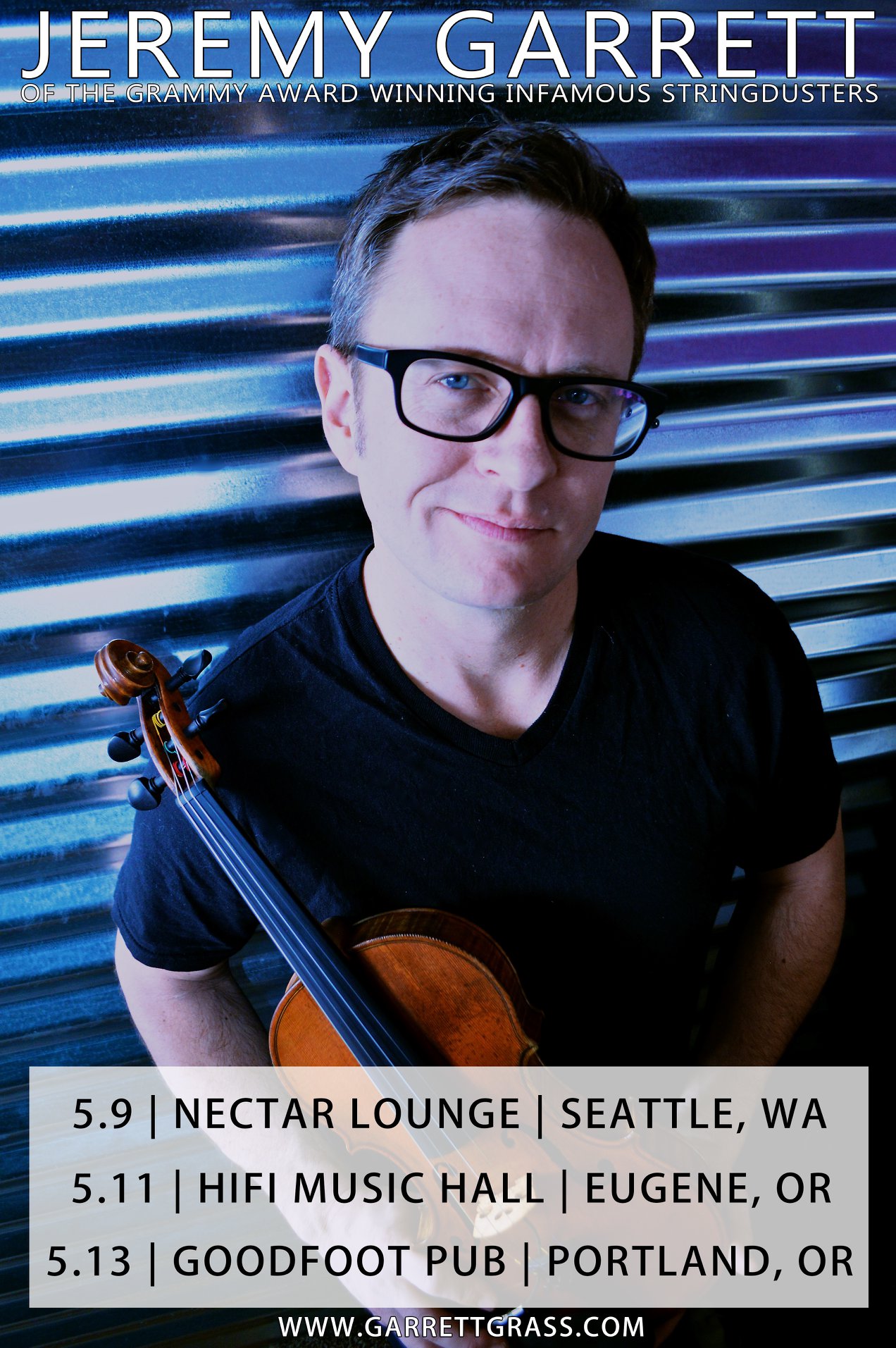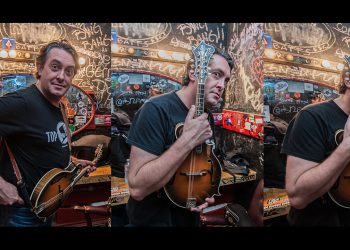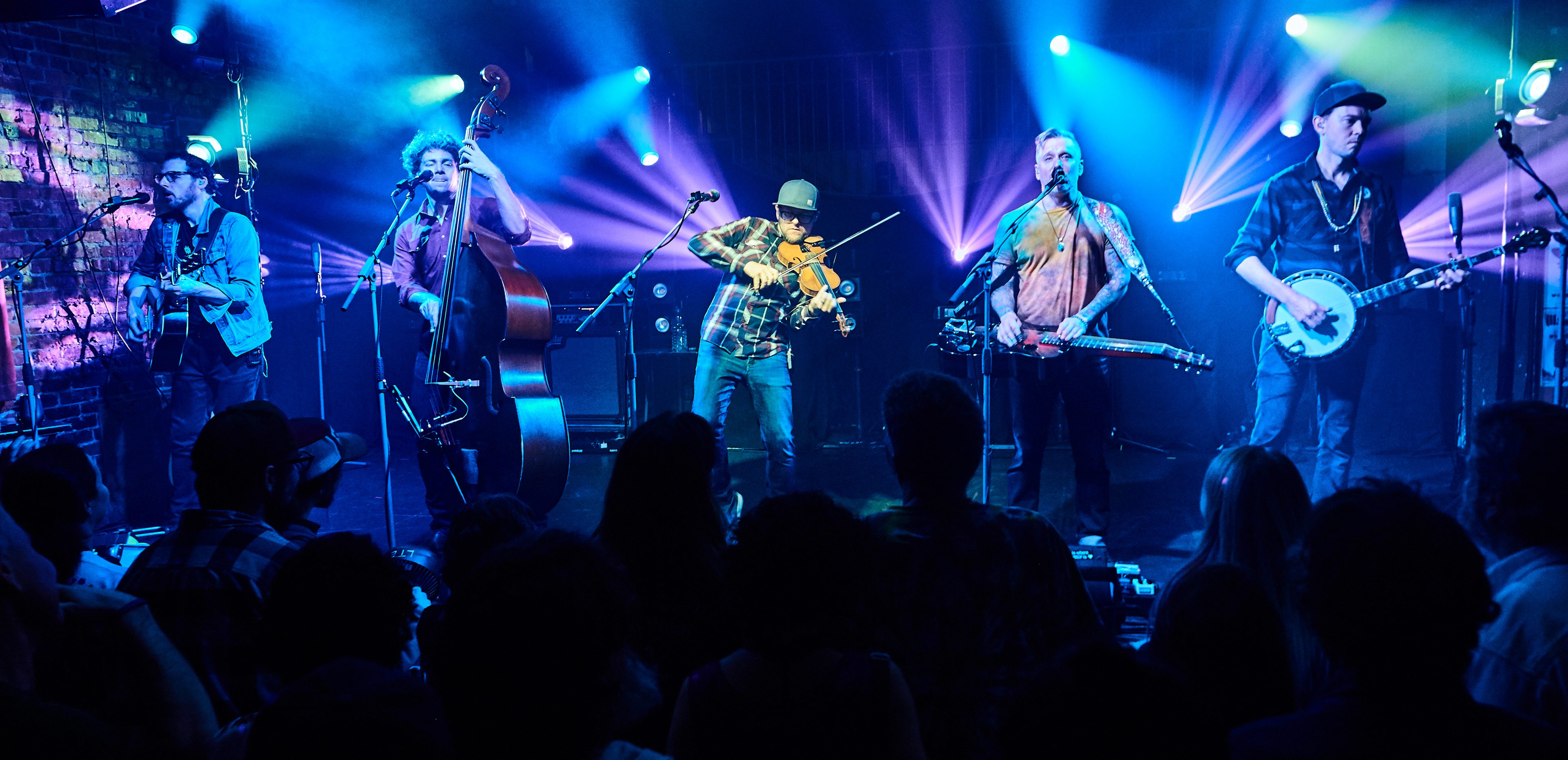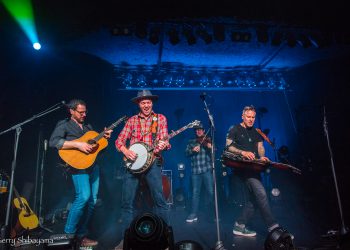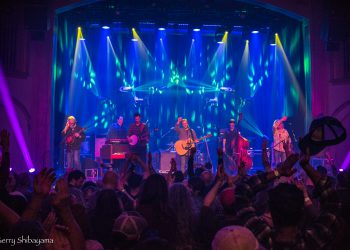Heavy On the Jam had the chance interview Jeremy Garrett before his solo tour performance at the Nectar Lounge in Seattle, WA, on May 9th, where Jeremy talked topics ranging from his songwriting on The Infamous Stringdusters’ Grammy Award winning album Laws of Gravity, his musical influences, heading back into the studio with the ‘Dusters, and what makes this Fiddle Science Solo Tour so special.
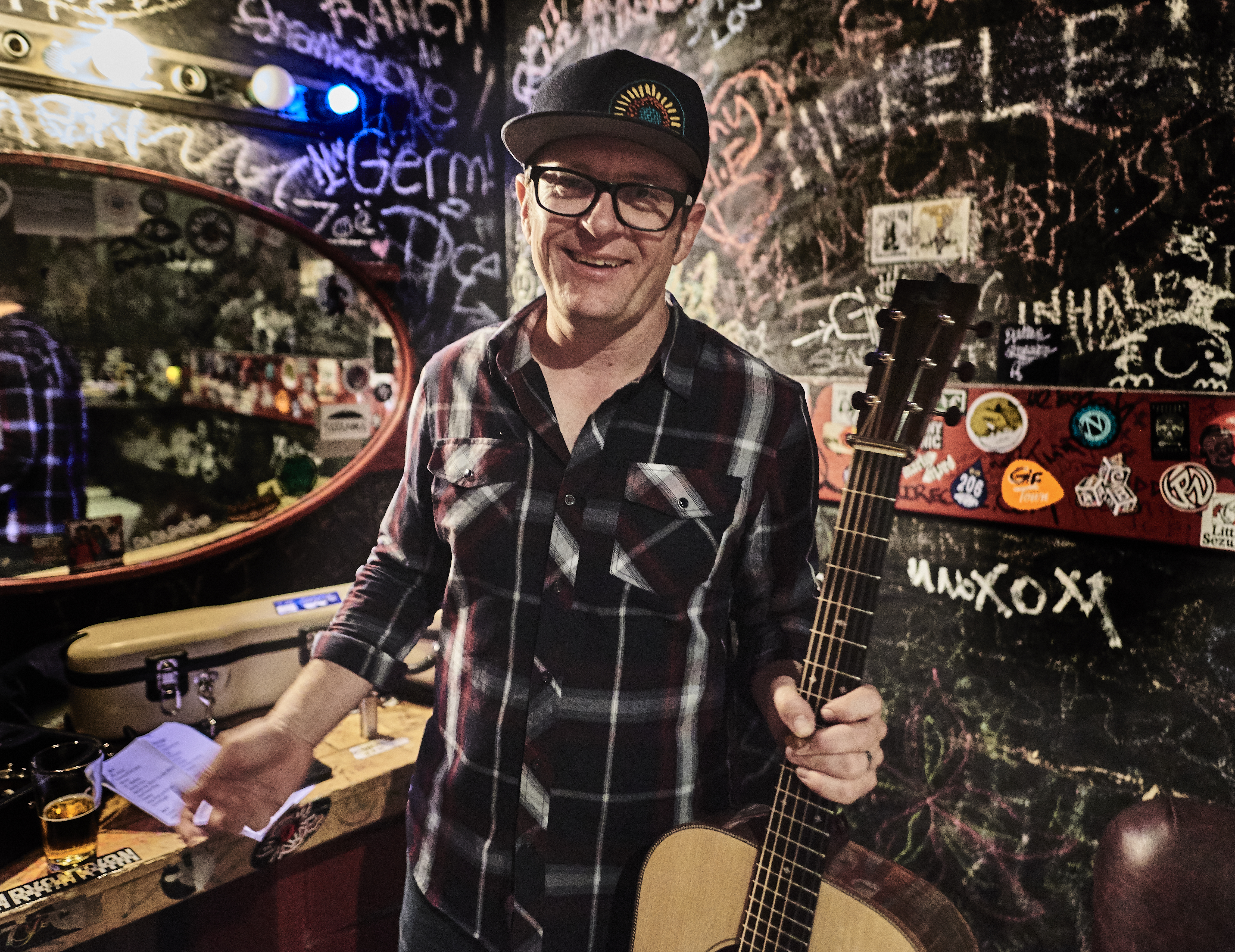
Heavy On The Jam: I want to start off by talking about The Stringdusters’ Grammy Award winning album Laws of Gravity. You mention on the Laws of Gravity commentary that the opening track “Freedom” was inspired by your decision to sell your house and live in your RV. Have you written any other songs about big transitions in your life?
Jeremy Garrett: Every single song I write is about a big transition in my life, what are you talking about? (laughter) No, seriously, though. I guess that’s what you’re always doing is trying to be reflective as an artist. That’s how it comes out emotionally, and I guess it’s through music for a lot of artists and writers, especially.
All of those big ideas hopefully come through, hopefully they’re not all heavy transitions in life, and some of them can just be lighthearted and chill. “Travel Light” is one. Also, a lot of these I co-wrote, and it could be that my co-writer has a certain emotion going on, or vibe, you know—and that’s where they’re coming from—so I’m just lending my musicality, or maybe some lyrics or something. It could be a variety of things.
But “Freedom” was inspired by living life and just getting out of what is—for lack of a better term—the matrix. You know, sort of getting out of it for a little while. And it was really hard to get out of the matrix, actually, and it’s surprisingly difficult to really get fully out. And then to get back in, it’s–surprisingly–almost even harder. (laughter) It’s kinda funny. It’s a fun thing to get perspective on in life, if you ask me.
[Listen to “Freedom” here and “Travel Light” here.]
HOTJ: You mentioned co-writers, and co-wrote lots of songs on Laws of Gravity. How do you identify a good co-writer?
JG: Well, a lot of these guys I met in Nashville through different music events and stuff, and they’re just people I’ve come to admire. Jon Weisberger, who I’ve written about 50 songs with, him and I get together still, even though we’re miles apart, we’ll still get together every once and awhile and write some songs. He’s just a great lyricist.
Jon’s written a bunch of liner notes, hundreds of liner notes, for bluegrass artists. Actually, I bet if you open your bluegrass record collection and you look through there, he’s probably written half of the liner notes of the artists that you have. He’s just really prolific, and it takes that to make a good song.
Coming from the younger side of things, getting into the songwriting thing when I was a little bit younger, I was good at the music part, but I needed to learn and get more perspective on lyrics, so I try to write with people who are really good lyricists, and who would make me better.
Jon and a feller named Josh Shilling is another guy I’ve written a bunch of songs with and Danny Walker, a good buddy of mine from Nashville, as well. And a bunch of other people, too, you know. I really like to write with females. I feel like they’re better at words than males are. So that’s really fun to sort of get in a little deeper in that regard, emotionally speaking, you know, from a guy’s vantage point.
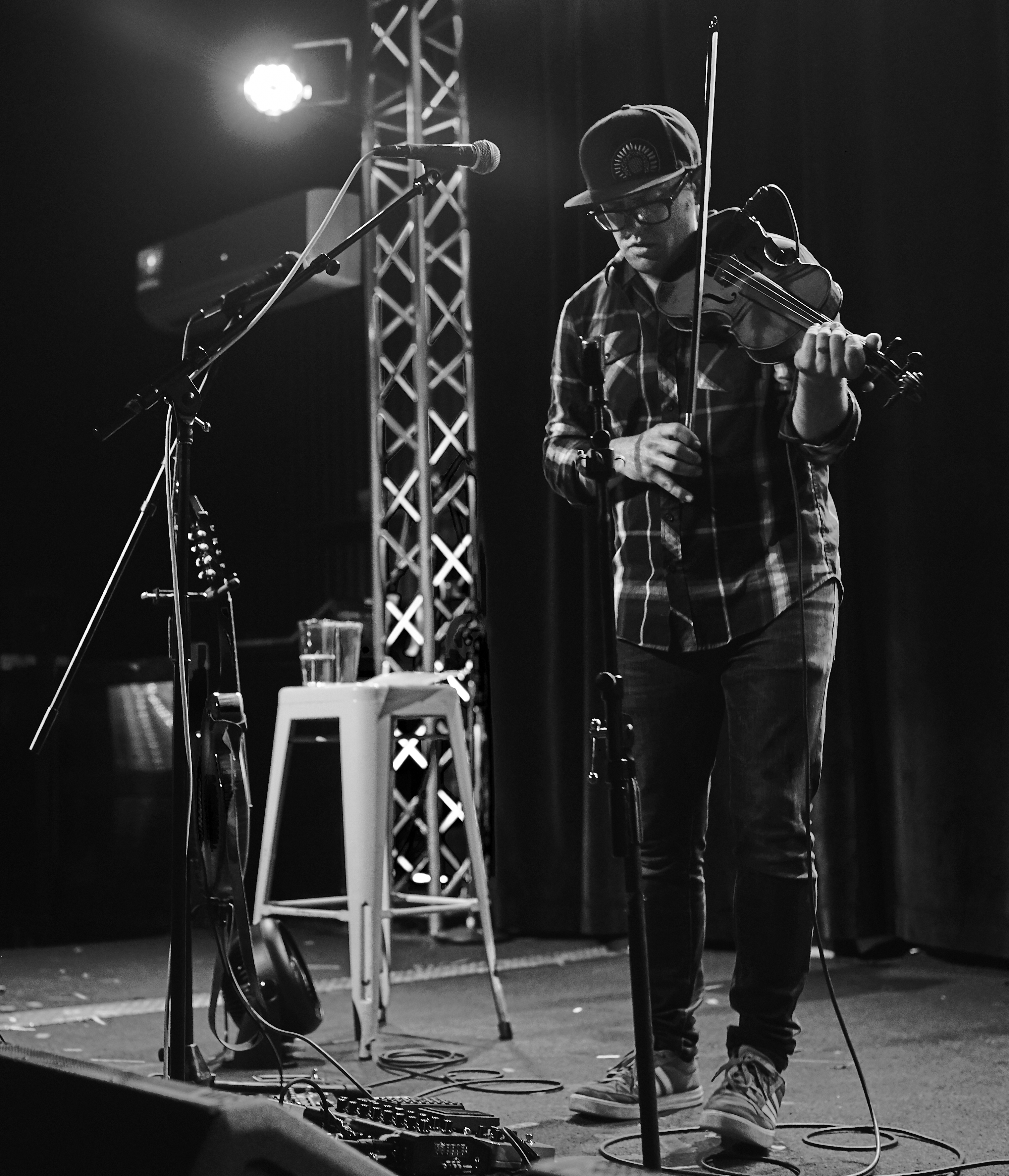
HOTJ: Who are some songwriters or musicians you’d like to collaborate with?
JG: Hmm…. Bono from U2! (laughter) Come on—That’s what I’m talkin’ about! He’s probably the best I’ve ever heard— he’s an absolute genius. I’ve never heard anybody who can pull my heartstrings harder than that as far as, like, just reflective thoughts that you can meditate on that don’t necessarily lend you to think that the song is about one thing or another. You can just sort of, be in it, and it means something different, maybe, to everybody, you know? That’s amazing to me, to be able to have that ability.
There’s another guy named Harley Allen who is now passed away, but he’s probably my favorite country songwriter that I’ve ever heard. He was incredible, you know, the way he was able to spin tales and spin words and just come up with clever twists in his songs that literally can just make you cry as you’re listening to the song—and that’s, for me, hard to admit and hard to do, actually, ’cause it takes a lot to impress me these days. Also Andy Cohen, you know, those guys.
There’s so many great writers out there and, shoot, I’d love to write with any of them that would like to write with me. You know, that’s the way I look at it. Just more experience and more ideas and just a different way. And I pick up tools and tricks from every single person I write with, no matter the level, so that’s kind of a fun thing for me to do.
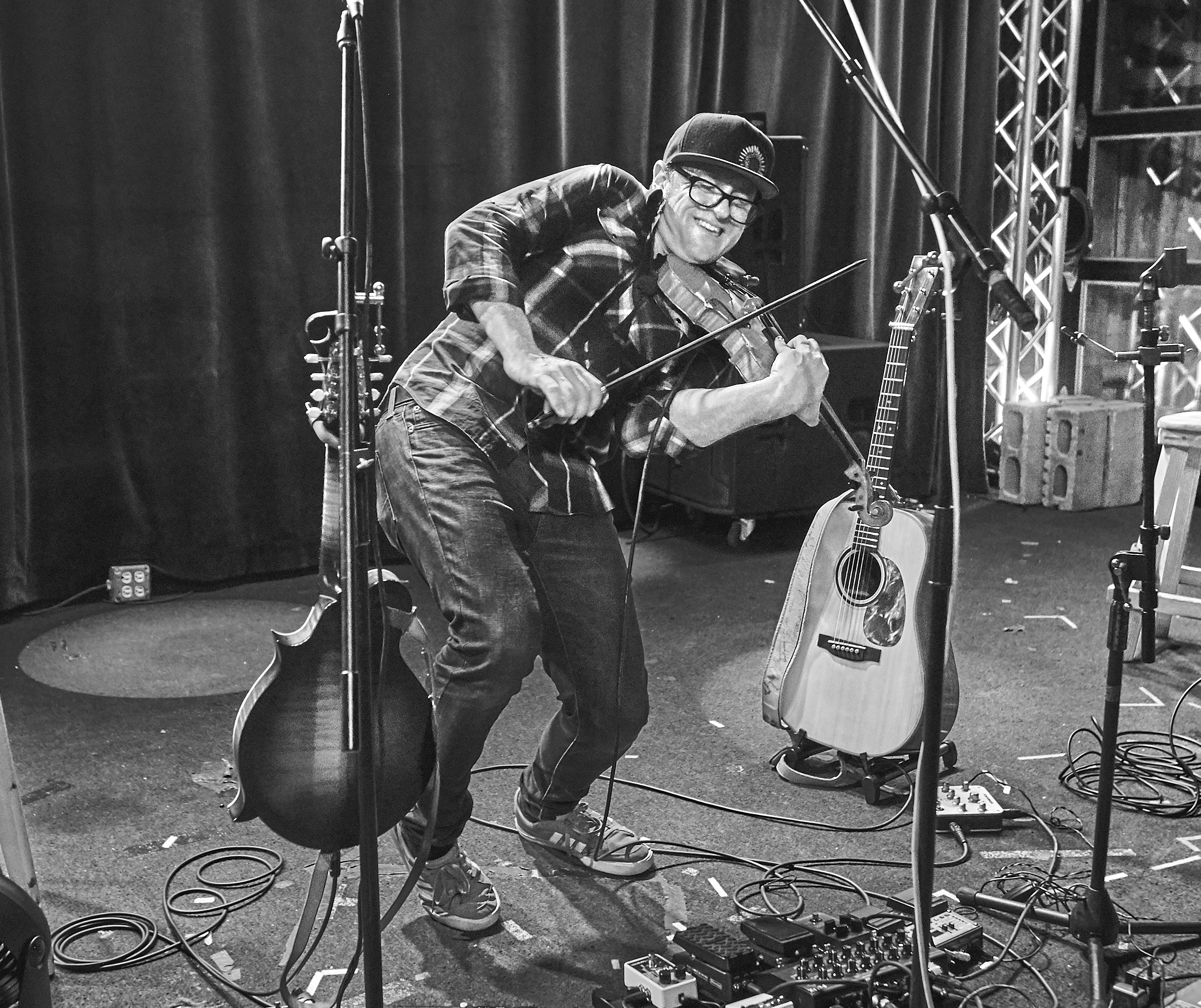
HOTJ: Speaking of albums and collaborations, I hear the Dusters are working on a new album. Can you share anything about that?
JG: It’s gonna be awesome. (laughter) I’ll share that with you. And we’re going in the studio next week, so that’s exciting. I don’t know how much I can share ’cause it’s sort of top secret, this one, up until the information really starts coming out, so we’re being really tight-lipped about it. But it’s all original again, and that’s my most exciting news about it.
And there’s a lot more to it than that, but I’d be afraid to share it at this point just ‘cause I’m not sure—I haven’t talked to anybody—you know, to find out what exactly the program is gonna be ‘cause we’re just going in next week. But we’ve done a lot of pre-production and the songs are ready to go. We’re ready to go in and just rip it.
HOTJ: Well, we’re psyched.
JG: Yeah, me too. I’m very excited to get some new stuff out there.
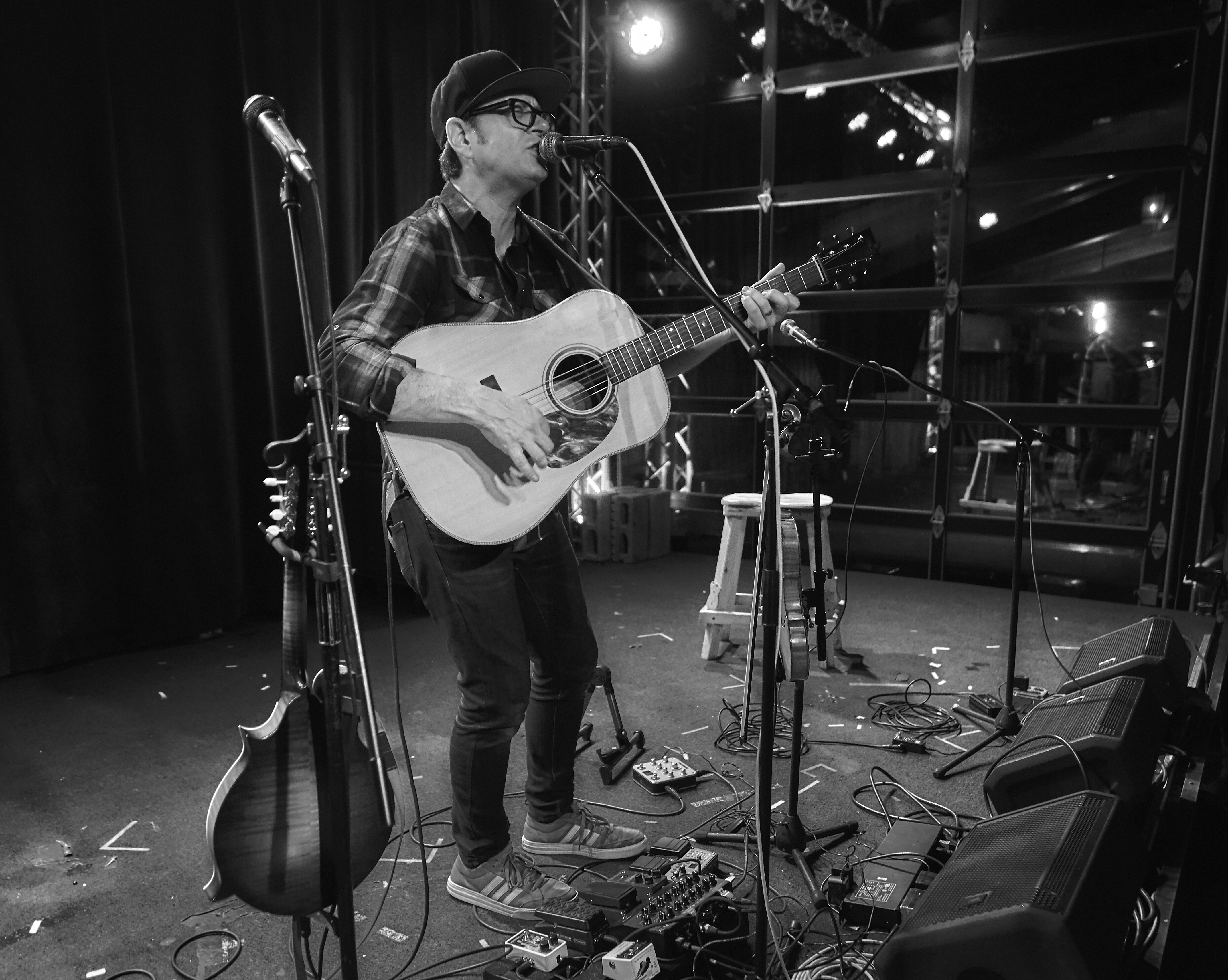
HOTJ: So, going back to songwriting, how do you determine if a song that you write is going to go to your solo career or to the Stringdusters?
JG: You never know. I’m in the idea, or in the mindset, that I bring a lot of songs to the table ‘cause I write a lot, and so it’s not always about one particular song that I think will work with the Dusters, or one particular song that will work with my solo thing. It’s just sorta like, “Maybe I can hear the Dusters on this,” and I’ll bring it to ‘em, and it doesn’t always work.
But the solo thing for me is just, you know, they definitely work ‘cause I wrote the songs and I have my own arrangement. At least for me, they work, and I experiment to see what hits the audience with different things, too. I mean, I won’t bring out, like, the bottom of the barrel songs, but I’ll try to bring out my A-game on everything.
So solo songs, I really try to pick songs that fit that whole thing, whether it’s gonna be guitar or vocal. But now, the looping makes it possible to sort of bring in all these other instruments and it’s just sort of been a whole new dimension, basically, for me, on this whole last couple runs.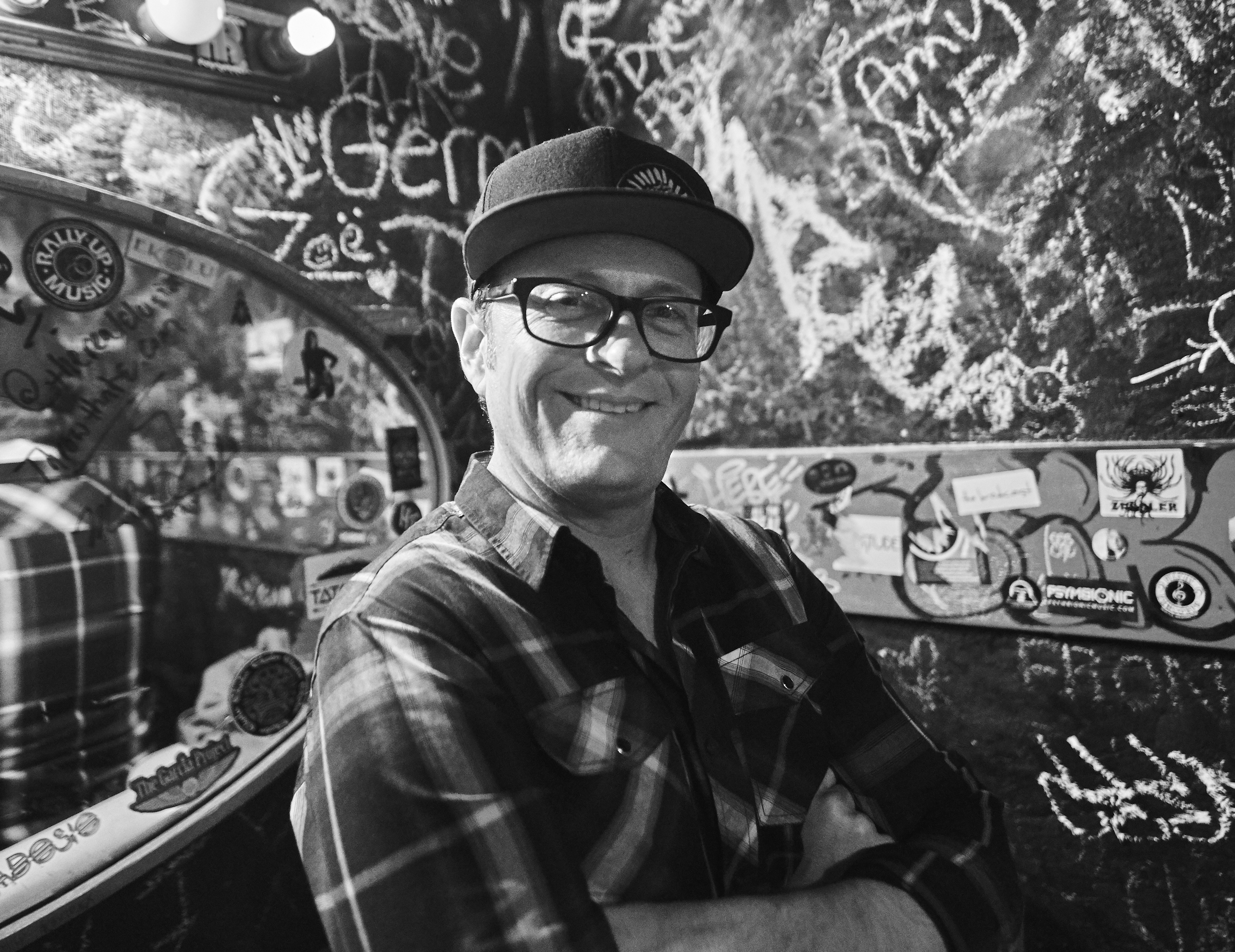
HOTJ: Yeah, and I actually wanted to ask you about the inspiration behind the looping, because it’s not really a bluegrass technique. So where did that come from?
JG: Well, nobody wants to play with me (laughter), and I had to have some way to play, so I just got this machine that did it, and it’s a miracle, really. Naw, in reality, I’m really inspired by a guy named Keller Williams, and Zach Deputy. Both those guys are geniuses at looping, and they do way more than I do, but, you know, I just kinda play guitar a lot, and play mandolin and fiddle, and I was doing a solo show and I would play guitar and sing my songs and I’d put my guitar down and I pick up my fiddle and I’d do some stuff with that and this wasn’t really congealing as much as I wanted it to, you know, overall.
It was fun and it was cool and I could still do that broke-down, sorta folky set I guess you could say, but I just needed a little more gas on the show, especially if it’s just me. Some people want me to play for like 3 hours. That’s a long time for one dude. So you gotta come up with a lot to really fill that space and that void. And so, it was just an experiment, and basically three months ago I just went into the woodshed, my basement, and every single day I had off, I spent all day long just learning how to use the loop and getting good at it.
I basically relearned how to play my instruments, too, because to loop instruments, it’s totally different than actually playing them in a situation where you’re just like jamming. It has to be way more focused, way more tight, the rhythm has to be absolutely perfect, or close to it, and if you mess something up, maybe you get one chance to undo it, and then you’re done. And that happens.
I’ve had some catastrophes, but mostly I learned from ‘em, and I’ve done alright. But I’ve put in, like, work, you know, to really get comfortable with the machine and putting guitar and mandolin and fiddle and then syncing all that together, and then getting out of the song. I want to grow. I have a lot to learn. Especially from Keller and Zach Deputy. They can blend songs together, they can do all these different things. And I can do some of that, you know. I have a somewhat small setup ‘cause it’s just me traveling around the county, driving three instruments and everything, so I have to watch how much weight everything is, but I plan to grow it and get it a little bit bigger and do more with it, of course, as time goes on.
But for me, it’s just been a release because putting your fiddle out there while I’m singing at the same time–I can do that–but it’s also like a full body aerobic workout. So the fact that I can lay down some guitar track and I have some rhythm so that everybody can sort of get in sync with what’s going on around what I’m playing with the fiddle.
Sometimes that’s hard for people to imagine. Like, they’re just hearing the fiddle. It’s hard to imagine what the chords could be around the support of what that sound is, so having that guitar back there helps give that away a little bit, and it makes it easier on me. So, I’m running around a little bit, and it’s harder in some ways, but is also sort of easier, ’cause when I pick up my fiddle and I’ve got a guitar track and a mandolin track or something laid down, I can just rip, you know.
HOTJ: Right. And it kind of makes it more accessible for people.
JG: Yeah, and I don’t have to be so concentrated and focused on making sure the fiddle is right. I can just play.
HOTJ: So I know that as a musician, you’re supposed to be equally excited about every song you play, but I figure you must have some favorites, so what are your favorite solo songs to perform?
JG: For solo, um, I don’t know. I go through seasons with songs, you know. I’ll like a song for awhile, and then I’m like, alright, I’m kinda tired of that… Now I’m with this song for a little while. I’m also really affected by where I’m at, and like what season it actually is.
Lately I’ve been into this tune called, “Fly Away To Your Love,” which is on my RV 1 Sessions, and it’s because I can loop em all together, and I can get that sorta going, and that’s been my opening track. I think I’ll even open with it tonight, ‘cause it sorta sets a good vibe for what I’m trying to do. It sorta gets everything going so there’s not a whole lotta guessing as to, “What’s gonna happen next,” you know. I’m not trying to run a circus, I’m just trying to play some good music and not do too much cheesy stuff at the same time.
I’m trying to make a good balance, so it’s musical and creative and enjoyable, and not like just some gimmick, you know. So when everybody comes, they’re not like, “This is cool, but I’ll never come to see this again. This is awesome, but why would I listen to this?” I’m trying to make real art. And it’s definitely an experiment, and I’m growing with it, and we’ll see if people seem to dig it that way, or tune into it the same way I’m thinking about it.
[Listen to “Fly Away To Your Love” here.]
HOTJ: Right, like something for everybody.
JG: Yeah, and I’ll bring in some Dusters songs, and definitely songs I wrote in Nashville and different things as it goes along. Hopefully the pace will change, and you know, like I said, just kinda bring in some stuff people haven’t heard, too. A lot of people haven’t heard me pick mandolin or guitar, you know, so I’ve been bringing that in. A little bit more all the time. That’s been fun.
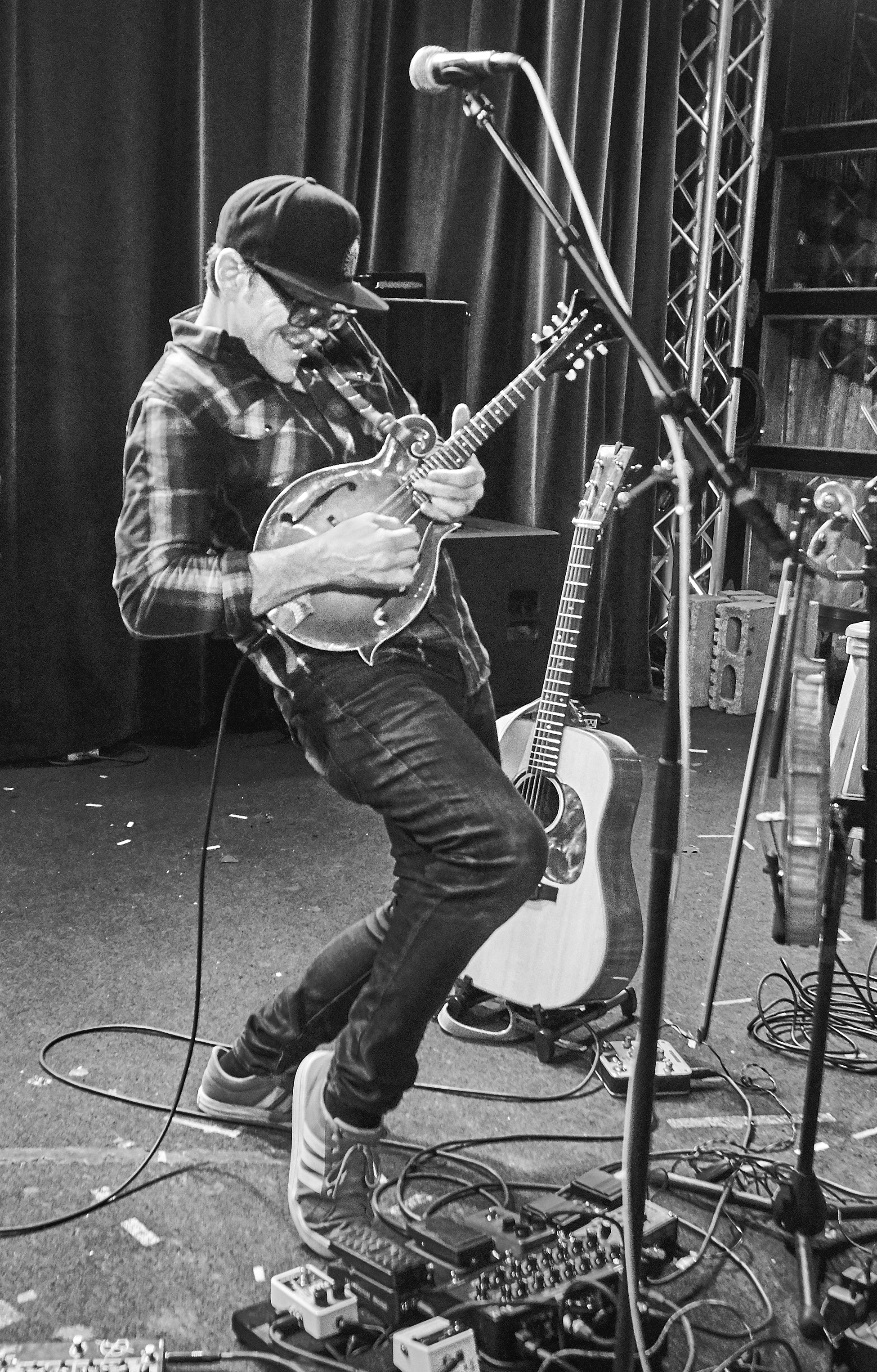
HOTJ: Yeah, it’s definitely fun, especially as an audience member who usually just gets to see you play fiddle with the Dusters, it’s cool to see your other talents.
JG: Well, I noticed there’s been some solo shows going around by people in the jamgrass world, and that’s great. I think that’s cool to see what the people do, what other talents do they have, what other depths do they have as a creative musician.
I mean, you see us as a band, and really, we’re better as a sum of our parts than we are individually, I feel, but we all individually have a lot of other strengths that don’t get utilized, necessarily, too. It’s a free role to be in the Stringdusters. You can do whatever you want, but it kinda still ends up being a role. I mean, there’s just appropriate things, and there’s inappropriate things. It’s not really appropriate for us to be switching instruments, but everybody plays different instruments, you know, and have other songs that don’t get played in the Stringdusters.
For me, I like the challenge. Playing in the Stringdusters now is just chill. I don’t have to stress about that gig, you know, unless I’m doing some new song that I can’t remember the words to. That’s my hardest thing, remembering lyrics.
But, you know, I don’t really hardly ever get nervous, and I don’t mean that in a bad way: it’s awesome. I feel super great about that. But I also am a guy that I really needs a challenge, and I love a good challenge, and so for me there has been this epic focus of ‘challenge.’ To just put yourself out there by yourself and see if you can do it. And, I knew I could, down deep inside, but really, can you when you really set out to do it? You know?
You set out, and sometimes you’re like, “I’m not really sure if I can do this…” Even last week, I had a tour, and some of those shows, I was like, “Man, I don’t know. Is this right?” But, you know, I can’t help it, ‘cause I’m an artist and I need to do these other things. I get restless if I don’t have those avenues of creative outlets. Getting restless isn’t good for being, and it’s not good for other people around me, and that kind of thing.
HOTJ: And you’re not ever gonna grow if you don’t push your boundaries a little bit.
JG: Yeah, I really believe in that, especially because I’ve been playing since I was 3, and I’ve always believed in being the best that I can possibly be at my craft, and I’m super passionate about that. I’m no genius or whatever, but I’m at the edge of what I can do, and that’s my goal: to try and be in that zone. And it feels great. When I get to play with the Stringdusters, it’s like, I can just relax and do my thing. And I’ve been around long enough, it’s not that hard anymore. But I’m also really able to call upon a vast amount of experience and push myself to another realm. It’s really satisfying in that way. The solo thing is awesome and satisfying in that same way.
HOTJ: And it all kinda works together, in the end.
JG: Totally. It makes me better so that when I go back to the Dusters, I’ll be better with them, and vice versa.
HOTJ: Speaking of the Stringdusters and being on tour, in general, how do you unwind when you have some time for yourself?
JG: (laughter) I can’t seem to do that lately! I don’t know what my problem is. I can’t seem to stop working, and that maybe therein lies the problem, I don’t know. I love music and I love to bring what I do to people, and there’s just not enough time in this life to sit idly by and just wait for things to happen.
I’m really passionate about being able to chase those dreams and try to do things that are fun for me, and satisfying, and also, just like anybody, I’m trying to set myself up for my future and have a long career. I’m not planning on doing anything else in this life. This is what I’ve been doing my whole life, so because of that, I have to be smart, also, and try to diversify what I do a little bit. That’s also been the goal for me.
But, I live in the middle of the woods, off the grid, and so that’s really my whole go-to for… that’s my Monticello, so to speak. It’s my place that I go to rest, and I don’t really have to do anything. It’s super quiet. I don’t really hear any engines and jets and trains and cars or anything. It’s very quiet. You know, I like to work on my land. I’ve got a few acres, and it’s just kinda fun to get out there and do that. That’s how I like to unwind.
